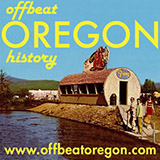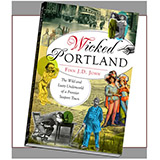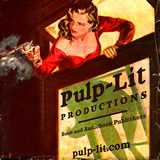NOT-SO-BRIEF BIO
Introducing myself:
Updated: October 2017
Hello tigers! I'm Finn J.D. John. But, you knew that, so let's move on. And by that I do mean “move on.” As in “Nothing to see here.” You're not seriously interested in all this crap, right? Life is short! Those "I Dream of Jeannie" reruns aren't gonna watch themselves, you know! ... you're still here? OK, fine, let's do this.
I bill myself as a college teacher, author, publisher, audiobook narrator, and public historian. That's a mouthful and it's hard to deliver it without making it sound like so much dilletante-y mush. Trust me, it fits together. I'm not sure how, but it does.
My three hustles:
I run three different rackets. Two of them pay me money; the third doesn't yet, but I have high hopes.
Racket One provides health insurance: it's my day job as an instructor in the New Media Communications department at Oregon State University. It also provides intellectual oxygen — teaching undergraduates keeps me constantly in touch with a whole community of brilliant people, colleagues as well as students. I'm dead sure I've learned more from my students than they've learned from me. That's the power of collective intelligence. I may be the most knowledgeable person in my classroom, but the combined knowledge of 30 undergraduates dwarfs mine like a monster truck looming over Mr. Bean's Mini Cooper. One of the signal challenges of my teaching practice is trying to tap that collective intelligence for the benefit of everyone in the room — including me.
Racket Two also makes money. It's Pulp-Lit Productions, a trans-media publishing house specializing in pumping out omnibus collections of classic pulp titles across multiple platforms: hardcover, paperback, e-book (EPUB, Kindle, and Interactive PDF), and audiobook. People like this, especially the audiobook part, and buy my books. It's nice. I mean, let's face it, no way could I afford a $700-a-day cocaine habit on a college teacher's salary. D'oh — did I say that out loud?
Racket Three is my original “side hustle,” started way back in 2008 when I first bid a tear-streaked adieu to the world of professional newspaper journalism and set out on my quest to get more educateder (details below). It's Offbeat Oregon History, “A Public-History Resource for the State We Love,” which despite its somewhat silly name has grown into a franchise of which I'm very proud. If I knew what was good for me I'd drop it and focus on the other two rackets, but I guess I don't. Plus, the pure pleasure of doing it is worth something to me.
The personal stuff:
I live in a rustic tenement tucked deep in a soggy forest glen a few miles west of Lewisburg, in a place that reminds me of H.P. Lovecraft's description of the hills west of Arkham in “The Colour out of Space.” I live there with my wife, Natalie; our 17-year-old son, Nate; and my mother-in-law, Endora (just kidding! Her name's Pauline); as well as two lazy and useless cats, two loud and obnoxious beagles, and 20,000 mice.
I was born in the Willamette Valley in the late 1960s, and grew up in a deep, primordial forest pretty similar to the one I live in now, located six miles outside the tiny timber town of Molalla, just down the road from Wilhoit Springs. That was during the “good times,” when good-paying jobs as a logger or mill worker were practically there for the asking. Of course, it couldn’t last. We were cutting trees way too fast; sooner or later we’d run out. We did run out, before I was old enough to start working, which is kind of a bummer because I never got the experience of pulling green chain in a sawmill.
When I hit sixth grade, my family moved to Beaverton, and a couple years later to southeast Portland — where I went to high school. So when you hear about the “urban-rural divide” in Oregon, well, I can tell you something about both sides. (I've never lived east of the Cascades, though, so you “dry-siders” are on yer own. You lucky schmucks. I especially love Lake County.)
I was paroled — er, that is, I graduated from the University of Oregon in 1991, just after Ballot Measure 5 delivered the second installment of a one-two suckerpunch combo to the Oregon economy — the first was the virtual shutdown of the state’s independent timber cutting and processing outfits in the late 1980s.
Newshounding:
After graduating, I went into the timber industry myself, after a fashion. I landed a gig as a reporter for the Silverton Appeal-Tribune — which was printed on paper made in Oregon City. Basically, I got the job because I was willing to do it for $6.93 an hour. It sure didn't feel like the start of a lucrative career ... and lemme tellya, it wasn't; it was more like the start of a debilitating addiction. (“Hi everybody, thanks for inviting me to this meeting. My name is Finn, and I'm a deadline-o-holic.” “Hi Finn ....”)
I spent the next 17 years trying (with mixed success) to figure out how to do newspapers right — with a four-year interruption from '95 to 2000. (During that four-year hiatus, I first tried and failed to turn myself into a mortgage-company loan officer; launched a successful real-estate advertising magazine; ditched it and bought a “regular” magazine, which failed spectacularly in less than a year; tried and failed to turn myself into a Volvo salesman; and finally came crawling back to newspaper journalism when a gig opened up in Cottage Grove.)
Over those years I worked at various times as a staff writer, copy editor or editor at the Cottage Grove Sentinel, The Springfield News, the Corvallis Gazette-Times, the Albany Democrat-Herald and the (Orcas) Islands' Sounder, and as a correspondent for the Salem Statesman Journal, Eugene Register-Guard and New York Post.
By 2008, though, I knew I needed to make a change. Increasingly, I felt like the loggers had in the late 1980s. My industry was changing — and shrinking — fast. Also, I was feeling none too secure at work, where my longtime and much-admired boss, Rob Priewe, had been shot out on his ear and replaced with a fellow who, I knew, already thought of me as a loose cannon. He was wrong, but you can spend half your life trying to change other people's opinions about you and all you end up doing is wasting time; people's first impressions represent substantial investments of time and ego, and trying to convince someone to walk away from that investment is a losing game. I needed to leave before the door hit me on the taff rail, not after. So I started looking for grad-school options. I wanted to take my nonfiction writing to the next level — I wanted to get into writing books.
I ended up in the literary nonfiction program at the University of Oregon’s School of Journalism and Communication, headed by Professor Lauren Kessler (Dancing with Rose; Stubborn Twig; Clever Girl; Happy Bottom Riding Club; Full Court Press; After All These Years; When Words Collide). Lauren, in whose fan club I proudly claim membership, was doing exactly the kind of work I wanted to learn to do.
Offbeat Oregon: The Spawning
When I left the newspaper racket, I felt the need to hang onto something from it. It had been 20 years since I'd lived a deadline-free life, and frankly, I didn't think I was ready for such a big step. So I went to my boss — the new guy who didn't trust me — and hit him with this pitch: I would contribute a column every week to the paper, which he could pay me for as a stringer. It would be on the subject of weird, funny stories from Oregon state history — stuff like the exploding whale in Florence. This was an idea I'd tumbled to on a weekend trip to the beach, and the more I'd thought about it, the better it had seemed. After a couple years of cranking out a weekly column, I'd know more about Oregon history than anyone I knew, and at that point, by Godfrey, I could haul off and write a book!
Thus was born the “Historic Oregon” column, which after the following December turned into the Offbeat Oregon History franchise.
Basically, everything in my professional life today sprang from Offbeat Oregon History in one way or another. It even turned out to be the source for my final project for my master's degree. While doing some research for a column in 2009, I learned that one of the U.S. presidents lived in Oregon once. Actually, he grew up here, from age 11 to 17. His name: Herbert Hoover.
Somewhat disappointed that it wasn’t a more glamorous ex-president, I followed up to find out more about Hoover’s time in Oregon — and stumbled onto one of the best kept secrets of American history. As it turns out, this “boring, stodgy” ex-president actually was personally responsible for saving more people’s lives than Hitler and Stalin took — most likely, five to seven times more.
Then he went on to become the president who was driving the bus when the Great Depression broke out. He came to represent not the concrete facts of what he’d achieved, but the abstract blather of a political viewpoint — to become, in essence, the darling of the anti-Roosevelt folks. And that’s his popular image even today: People may not remember the rescue of Belgium, Germany, Austria and Russia from starvation, but they sure remember living in a Hooverville, eating Hoover Hogs (armadillos), riding in a Hoover Cart (car with no fuel in it, pulled by a donkey) and sleeping under a Hoover Blanket (newspaper).
My project was a book proposal and two sample chapters of the book itself: the story of Hoover’s first foray into life-saving, in German-occupied Belgium in 1914. Few people know the story, but everyone should. Regardless of your politics, it has to make you a bit proud to know that the person who holds the world record for life-saving — throughout all of history — is an American.
Sigh. One of these days I'll get around to finishing up that project. It went onto hiatus in 2011 or so, in anticipation of the 100-year anniversary of the war (when a bunch more scholarship would come out) and I just got busy with other things.
Anyway, here's a link to the old project. It's tentatively titled America's Most Hated Hero. And if you'd like to see the state of my Mad Web Design Skillz circa 2011, well, check it out. I haven't updated it since then.
(The design of this page, that you're reading now, dates from 2012. Someday I'll remodel it too.)
Teaching
After clinching my SECOND degree from the University of Oregon, I lucked into my dream gig — at my alma mater's arch-rival, Oregon State University. Since then, I have become a self-proclaimed Naturalized Citizen of Beaver Nation (much to the dismay of my wife, Natalie, who remains a proud Duck). My opportunity came about when legendary journalism teacher Pam Cytrynbaum left OSU to take a job at Northwestern University in Chicago. They needed somebody, and needed him fast; I was available and ready to go; so I went.
From both professional-development and personal-fulfilment standpoints, this has been one of the best things that has ever happened to me. Given the choice between that lucky break, and a $5 million Lottery win, I would probably ... pick the Lottery win, of course. But, I would probably have to think about it a bit. It really was that big.
The new gig encouraged me — no, required me — to develop expertise in both theoretical and practical aspects of new media and social media, which I was almost wholly ignorant of in September of 2010. I was an old-media warhorse, of the sort that kind of flooded the job market about a year later when the hard times started to really hammer the newspaper world. And I knew if I expected to keep my job, I would need to develop some new-media skills, and quick.
Luckily, I had a franchise that I could use to develop those skills in the real world: yep, you guessed it — Offbeat Oregon History. I had turned it into a syndication service in December 2008, and had been quietly pumping out a column a week since that time, supplying them to every non-daily Oregon newspaper I could find an e-mail address for; a few months later I'd called upon my mid-1990s-class HTML coding skills and produced a horribly dated Website to put my archive on. I'd created a Facebook page, too, and even a Twitter feed; but I wasn't doing anything with either of those.
Now I started to remedy that oversight. And I started adding other stuff to the franchise as well. The podcast was the first (and best) idea. I launched it in 2011, sitting in my chair and dorkily reading my column into the butt end of my twenty-dollar Droid X cell phone. It sounded awful. But I did it every weekday, and I subscribed to my own feed and listened to it in rotation with the other podcasts I listened to (“dogfooding,” it's called), and I bought new equipment when I could — and it was kind of amazing how quickly I got better and better. To the point where, when the opportunity to get into audiobooks came up, I was already sounding fairly professional.
Basically, starting right around the beginning of 2011, Offbeat Oregon History entered the chrysalis of transformation from a newspaper column with an archival Website, into a trans-media public-history franchise with a hub page feeding out into its various channels (RSS newsreader feed, daily podcast feed via iTunes and Feedburner, a Facebook page with about 5,000 "likes," an auto-posting Twitter feed, and a few other things). Along the way, I tried and abandoned a few other things: a YouTube channel (I can't edit video and ain't got time to learn), a Tumblr blog, a fleet of Pinterest boards, etc.). Oh yeah, and there was a newspaper column attached. (which, although easily overlooked, is still the core of the franchise).
The first book
In mid-2011 I took a break from my then-active Herbert Hoover project to produce a pop-history book on what you might (had you a sufficiently dirty mind) call the “naughty bits” of late-1800s Portland. The opportunity was offered to me, of course, because of the platform I had built at Offbeat Oregon History. The result was Wicked Portland: The Wild and Lusty Underworld of a Frontier Seaport Town, published in June of 2012 by The History Press. (The audiobook version, produced and narrated by Yours Truly, was released in January 2014; more on that in a bit.)
Wicked Portland was an utterly unmitigated pleasure to research and write. I had an absolute ball. And it introduced me to some of the real treasures of the history world — specifically, the University of Oregon Special Collections Reading Room, the OSU Archive, the City of Portland Archives and, oh yes, most definitely the Oregon Historical Society library.
History shows and lectures
For a few years after the book came out I made a regular practice of presenting public pop-history lectures — one-hour multimedia presentations on interesting bits of Oregon history, accompanied by a slideshow of historic photographs, visual wisecracks and gags, and pop-culture references — at the Jack London Bar, located beneath the Rialto Poolroom at Fourth and Alder streets in downtown Portland, on the first Tuesday of each month. I ganged up with four other pop-history mavens: Heather Arndt Anderson (author of Portland: A Food Biography and several other books); Doug Kenck-Crispin (resident historian and author of the Kick Ass Oregon History podcast); Joe Streckert (author and producer of the Weird History Podcast); and Joshua "J.B." Fisher (author of Portland on the Take: Mid-Century Crime Bosses, Civic Corruption and Forgotten Murders). We had a great time doing this, and performing in front of a live audience did wonders for my stage presence in the classroom ... alas, all good things have to end sometime, and for us, the fire that ravaged the Rialto in 2016 was that end. The place was rebuilt as a jazz club, and in the classy, cosmopolitan phoenix that arose from the Jack London's rough-and-ready street-punk ashes there was no room for edgy, F-bomby history lectures. We may yet find a new venue, but my sense right now is that everyone is on to new things.
The Audiobookie:
I mentioned the audio version of Wicked Portland. That project was my entree into what became my number-two racket: Pulp-Lit Productions, the publishing house. Here's how that went down:
In late 2013 I'd been podcasting for about two years and had gotten reasonably good at it. I was recording in an old pickup camper that I'd lined with carpet and filled with books, and by that time I'd upgraded my equipment — I was now running a Sennheiser e935 stage-vocalist's mic through a Mackie Onyx Blackjack interface into a computer that I set up outside the camper for noise reduction. I heard about Audible's Audiobook Creation Exchange, and wondered about narrating an audiobook edition of Wicked Portland. After bouncing the idea off my acquisitions editor at The History Press and getting the OK, I tried it out.
It was my first audiobook. It went ... OK. The thing sounds embarrassingly clunky today -- not surprising, since it was relatively early in my learning curve. But, it sold OK.
Well, I'd been a fairly hardcore audiobook consumer for years — going back to the late 1980s when I used to check out decks of cassette tapes from the Oregon City Public Library to listen to on night shifts at my summer job. Now that I had an audiobook in the marketplace, and knew how to do it, something occurred to me. I had, several weeks before, gone looking for a collection of the John Carter of Mars books from Edgar Rice Burroughs. But all I could find were individual titles. As an Audible.com member, I received an audiobook credit every month, which I could use to buy any audiobook — be it 2 hours or 90. I did not want to spend my credit on A Princess of Mars and then have to do it again for The Gods of Mars, when both those titles were in the public domain — there was no rights holder to be compensated for them, or to dictate how they could be offered. I realized that if I was thinking that way, surely others were too ....
So I buckled down and, drawing on my old newspaper-production skills, proceeded to publish a collection of the first three John Carter novels. It was a paperback published via CreateSpace; this was necessary because Audible required me to have a book available in the marketplace to anchor the audiobook edition.
Well, over the next year or so the paperback sold maybe two copies a month. But the audiobook did remarkably well. Well enough to cover my car payment. I was floored. (So was Natalie, who had just started to notice how much money I was drawing out of the family war chest and blowing on recording equipment ... so I guess I hit that micro-jackpot just in time!)
But it was a real Sally Field moment for me. "You like me! You really like me!" Of course, Sally Field never actually said that. But, I sure did.
The rise of Pulp-Lit
With the clear demonstration of demand for collections of public-domain books, I took a square look at the marketplace. It looked to be a bit of a sketchy thing, actually. First off, there was already a huge and still-growing cadre of get-rich-quick swindlers cranking out e-book versions of public-domain titles in hopes that someone would be ignorant enough to pay for them on Kindle. There were also a number of bundlers who would pack together huge collections of, say, everything Algernon Blackwood ever wrote, and charge 99 cents for the lot. They branded themselves with names like "MEGAPACK." These I was less skeptical of; they were delivering something well worth the price they were charging. But I still wanted to avoid being categorized with them.
So I figured I would have to create a brand identity that was very distinctive and professional, and publish in every format I possibly could: Hardcover, paperback, e-book and audiobook. And the hardcover would be a multimedia edition, coming with all the other editions bundled with it: e-book, audiobook, and a PDF to boot. There would be a web page for each title, formatted to look like an inside page of an old pulp magazine.
Essentially, that's what I did, and that's what I'm doing today. As I write this, I'm putting the finishing touches on Volume 3 of the complete collection of H.P. Lovecraft's works. It should be out by Thanksgiving and I'll be on to, probably, a collection of Robert E. Howard's hilarious and irreverent Sailor Steve Costigan boxing stories.
What's next?
What's next? Yipe. So much, there is so much to be done. I've written a novel, a historical-romantic-suspense job set in the Amazon Basin in 1928 and involving a trans-dimensional hidden city and a giant eldritch snake, and starring a delightfully steely Vaudeville girl named Prudence; so there's that to get out there. I'll be starting the audio probably in late October 2017. (I'm publishing it under a pseudonym, because "Finn J.D. John" is a publisher and narrator, and I don't want to dilute my brand; also, it would make me look even more like a dilettante. So, the novelist version of me is named "J.J. Davitt." It's short, it's punchy, and [most important] it's short enough that the letters on the cover can be REALLY REALLY BIG.)
Another upcoming project is a five-volume box set of Oregon funky-history stories based on the 565 Offbeat Oregon History columns I've churned out over the last 10 years. Maybe when that's done, I'll finally hang up that particular hat; but I'm loath to do so, for sentimental reasons (it is, after all, essentially the wellspring of my entire professional life) and because I haven't stopped learning cool new stuff about my state. But, look for that collection to hit the streets next summer. I'm tentatively planning on taking the whole summer off to get it done. We'll see if I can plan far enough ahead to be financially able to do that ....
So, there you have it. My story. And if it held your interest all the way to the bottom, we must have a few things in common. Drop me a line sometime at finn (a) finnjohn [.] com — and tell me yours!
—fz





